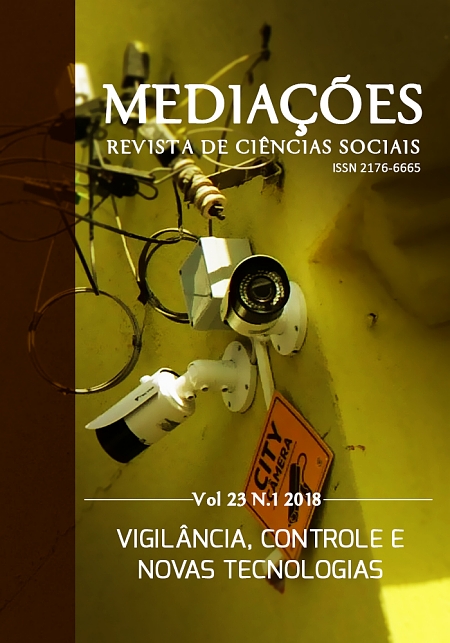Infraestruturas, economia e política informacional: o caso do google suite for education
DOI:
https://doi.org/10.5433/2176-6665.2018v23n1p63Palavras-chave:
Google, Infraestrutura, Privacidade, Vigilância, Controle, Economia informacionalResumo
O artigo examina o contexto e possíveis efeitos sociopolíticos da adoção de infraestruturas e serviços de tecnologias de comunicação corporativos no ambiente educacional e universitário brasileiro. Tomando o caso específico dos acordos entre universidades públicas brasileiras e a suíte de aplicativos educacionais da empresa Google, objetivamos refletir sobre sua economia política informacional, baseada em mecanismos de controle e vigilância dos dados digitais, e problematizar a emergência de novas formas de conhecimento e exercício do poder.Downloads
Referências
BRASIL. Decreto Nº 8.135, de 4 de novembro de 2013. Dispõe sobre as comunicações de dados da administração pública federal direta, autárquica e fundacional, e sobre a dispensa de licitação nas contratações que possam comprometer a segurança nacional. Disponível em: http://www.planalto.gov.br/ccivil_03/_Ato2011-2014/2013/Decreto/D8135.htm. Acesso em: 20 mar. 2017.
COLE, David. We kill people based on metadata. The New York review of books. 2014.
CRUZ, Leonardo Ribeiro. Novos modelos de negócio, vigilância ubíqua e as transformações no desenvolvimento da internet. Liinc em Revista, Rio de Janeiro, v. 12, p. 203-216, 2016.
EFF - ELECTRONIC FRONTIER FOUNDATION. Spying on students: school-issued devices and student privacy. 2015. Disponível em: https://www.eff.org/issues/student-privacy. Acesso em: 29 mar. 2017.
ESCOBAR, Herton. Orçamento de ciência e tecnologia pode encolher ainda mais em 2018. Estadão, São Paulo, 11 jun. 2017.
FEENBERG, Andrew. Transforming technology: a critical theory revisited. New York: Oxford University Press, 2002.
FUCHS, Christian. Web 2.0, prosumption, and surveillance. Surveillance & Society, v. 8, n. 3, 2011. p. 288-309.
GOOGLE e Facebook concentram 20% da publicidade global. Meio&Mensagem, São Paulo, 4 maio 2017. Disponível em: http://www.meioemensagem.com.br/home/ultimas-noticias/2017/05/04/google-e-face-seguram-20-dos-gastos-em-publicidade.html. Acesso em: 12 jan. 2018.
GOOGLE FOR EDUCATION. Informações sobre privacidade e segurança. Disponível em: https://edu.google.com/intl/pt-BR/trust/. Acesso em: 12 jan. 2018.
HUGHES, Thomas Parke. Networks of power: electrification in western society, 1880- 1930. Baltimore: JHU Press, 1983. Disponível em: https://medium.com/@Marta.K/dessas-coisasque-n%C3%A3o-d%C3%A1-para-entender-mas-que-a-gente-deveria-entender689a55b7b28f. Acesso em: 2 jan. 2017.
KANASHIRO, Marta. Dessas coisas que não dá para entender (mas que a gente deveria entender). 2016.
LINDH, Maria; NOLIN, Jan. Information we collect: surveillance and privacy in the implementation of Google apps for education. European Educational Research Journal, Oxford, v. 15, n. 6, p. 644 - 663, jul. 2016.
NSA prism program taps in to user data of apple, google and others. The Guardian, 7 Jun. 2013. Disponível em: https://www.theguardian.com/world/2013/jun/06/ustech-giants-nsa-data. Acesso em: 12 jan. 2018.
PARRA, Henrique Z. M. Abertura e controle na governamentalidade algorítmica. Revista Ciência e Cultura, São Paulo, v. 68, n. 1, jan./mar. 2016. Disponível em:
http://cienciaecultura.bvs.br/scielo.php?script=sci_arttext&pid=S0009-67252016000100013&lng=pt&nrm=iso&tlng=pt. Acesso em: 12 jan. 2018.
PARRA, Henrique Z. M. Controle social e prática hacker: tecnopolítica e ciberpolítica em redes digitais. Sociedade e Cultura, Goiânia, v. 15, n. 1, p. 109-120, jan./jun. 2012. Disponível em: http://www.revistas.ufg.br/index.php/fchf/article/download/20677/12328. Acesso em: 12 jan. 2018..
PARRA, Henrique Z. M.; ABDO, Alexandre H. Tendências democráticas e autoritárias, arquiteturas distribuídas e centralizadas. LIINC em Revista, Rio de Janeiro, v. 12, n. 2, p. 334-349, nov. 2016. Disponível em: http://liinc.revista.ibict.br/index.php/liinc/article/download/918/666. Acesso em: 12 jan. 2018.
PAYÃO, Felipe. Governo Temer vai abandonar software livre para comprar produtos Microsoft. 2016. Disponível em: https://www.tecmundo.com.br/microsoft/111214-governo-temer-abandonar-software-livrecomprar-produtos-microsoft.htm. Acesso em: 12 jan. 2018.
ROSSINI. Carolina; MOORE, Taylor. Exploring zero-rating challenges: views from five countries. Washington: Public Knowledge, 2015. Disponível em: https://www.publicknowledge.org/assets/uploads/blog/ZeroRatingCombinedCR.pdf. Acesso em: 12 jan. 2018.
ROUVROY, Antoinette; BERNS, Thomas. Governamentalidade algorítmica e perspectivas de emancipação: o díspar como condição de individuação pela relação? Revista ECO-Pós, Rio de Janeiro, v. 18, n. 2, p. 36-56, out. 2015.
SMYRNAIOS, Nikos. L'effet GAFAM: stratégies et logiques de l'oligopole de l'internet (pre-print). Communication & Langages, Paris, n. 188, p. 61-83, 2016.
TITCOMB, James (Ed.). Google hit with record £2.1bn EU fine for abusing internet search monopoly. The Telegraph, 27 June 2017.
UNICAMP. Políticas de privacidade para o serviço Google APPS for Education Unicamp. Disponível em: http://www.telegraph.co.uk/technology/2017/06/27/eu-hits-google-record-21bn-fine-abusinginternet-search-monopoly/. Acesso em: 12 jan. 2018.
UNICAMP. Políticas de privacidade para o serviço Google APPS for Education Unicamp. Disponível em: https://googleapps.unicamp.br/tutoriais/privacidade.html. Acesso em: 12 jan. 2018.
UNIVERSIDADE uruguaia teme que acordo entre governo e Google ajude espionagem. Agência EFE, Montevidéu, 9 jul. 2015. Disponível em: http://www.efe.com/efe/brasil/sociedade/universidade-uruguaia-teme-que-acordo-entre-governoe-google-ajude-espionagem/50000246-2660947. Acesso em: 12 jan. 2018.
USP - UNIVERSIDADE DE SÃO PAULO. Superintendência Tecnologia da Informação. Sobre o acordo de cooperação USP e Google. 2017 Disponível em: http://www.sti.usp.br/wp-content/uploads/sites/46/2017/03/Sobre-o-acordo-de-cooperação-USP-Google.pdf. Acesso em: 12 jan. 2018.
ZUBOFF, Shoshana von. The secrets of surveillance capitalism. 2016.
ZUBOFF, Shoshana. Big other: surveillance capitalism and the prospects of an information civilization. Jounal of Information Technology, Oxford, v. 30, p. 75-89, abr. 2015. Disponível em : http://www.faz.net/aktuell/feuilleton/debatten/the-digitaldebate/shoshana-zuboff-secrets-of-surveillance-capitalism-14103616.html?printPagedArticle=true#pageIndex_2. Acesso em: 20 mar. 2017.
Downloads
Publicado
Como Citar
Edição
Seção
Licença
Copyright (c) 2018 Henrique Parra, Leonardo Cruz, Tel Amiel, Jorge Machado

Este trabalho está licenciado sob uma licença Creative Commons Attribution 4.0 International License.
Os direitos autorais relativos aos artigos publicados em Mediações são do(a)s autore(a)s; solicita-se aos(às) autore(a)s, em caso de republicação parcial ou total da primeira publicação, a indicação da publicação original no periódico.
Mediações utiliza a licença Creative Commons Attribution 4.0 International, que prevê Acesso Aberto, facultando a qualquer usuário(a) a leitura, o download, a cópia e a disseminação de seu conteúdo, desde que adequadamente referenciado.
As opiniões emitidas pelo(a)s autore(a)s dos artigos são de sua exclusiva responsabilidade.




































